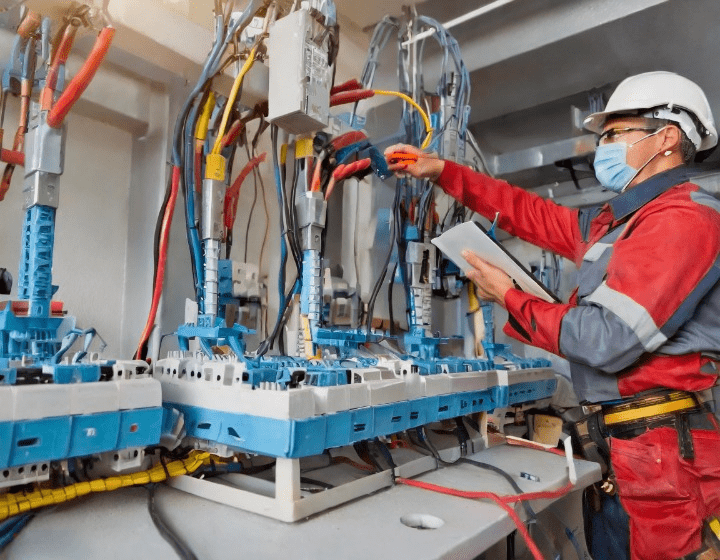
In the world of systems prioritizing safety, reliability, and adherence, to regulations is crucial. RKCT Laboratory in Jabalpur, known as the Best Electrical Testing Laboratory in India, takes pride in offering testing services. Let us delve into the intricacies of testing by exploring its categories, techniques, and industry standards while highlighting what sets RKCT Laboratory apart as a leading authority, in this field.
Types of Electrical Testing
The realm of testing encompasses an array of assessments to evaluate the efficiency, reliability, and safety of electrical systems and components. Some popular forms of testing include;
Insulation Resistance Assessment: This test gauges how well electrical insulation resists flow to identify any issues or wear that could result in equipment malfunctions or safety risks.
Continuity Check: Continuity testing confirms that electrical circuits are sound, ensuring a flow along the designated path, without interruptions or resistance.
Grounding Evaluation: Earth ground testing assesses the efficiency of grounding systems in dissipating faults and safeguarding against shocks or equipment damage.
Operational Assessment: Functional testing replicates real-world usage scenarios to evaluate how electrical devices and systems perform and operate.
Methods of Electrical Testing
Electrical testing methods vary based on the goals and needs of the testing process. Some used techniques include;
Visual Inspection: This method involves inspecting components, for any signs of damage wear, or corrosion that could indicate potential problems or safety concerns.
Non-Destructive Testing (NDT): NDT methods like thermal imaging, ultrasonic testing, and vibration analysis enable the identification of internal defects or abnormalities without causing harm to the tested equipment.
Invasive Testing: Invasive testing may require disassembling or partially dismantling components to perform detailed inspections or measurements.
Remote Monitoring: Utilizing sensors and data logging systems remote monitoring continuously tracks parameters such, as voltage, current, and temperature to detect abnormalities or trends.
Best Practices in Electrical Testing
To guarantee the efficiency and dependability of testing procedures it’s crucial to follow recommended strategies such as;
Regular Checkups and Inspections: Consistent checkups and routine inspections help pinpoint issues before they develop into costly breakdowns or safety risks.
Compliance with Standards and Regulations: Adhering to industry standards and regulatory guidelines ensures that electrical testing processes adhere to established benchmarks for safety, performance, and conformity.
Training and Certification: Employing individuals, with the training and certification guarantees that electrical testing responsibilities are carried out proficiently and accurately.
Record Keeping: Keeping records of electrical testing tasks, including test outcomes, observations, and maintenance logs aids in tracking progress and maintaining responsibility.
In summary, having an understanding of testing is essential to guarantee the safety, dependability, and effectiveness of electrical systems. RKCT Laboratory, in Jabalpur, recognized as the Top Electrical Testing Laboratory, in India, is dedicated to providing top-notch testing services that adhere to the standards of excellence and trustworthiness. Whether you require insulation resistance testing, continuity testing, or earth ground testing you can rely on RKCT Laboratory to offer solutions that cater to your needs and specifications.
Electrical testing is vital for identifying potential faults, defects, and hazards in electrical systems. By conducting regular tests, including insulation resistance, continuity, and voltage testing, risks of electrical fires, shocks, and equipment failure can be minimized. At RKCT Laboratory, we prioritize safety and reliability in every electrical testing procedure, ensuring peace of mind for our clients.
At RKCT Laboratory, we offer a comprehensive range of electrical testing services tailored to meet the diverse needs of our clients. Our services include insulation resistance testing, continuity testing, earth fault loop impedance testing, and more. With state-of-the-art equipment and a team of skilled technicians, we deliver accurate and reliable results, making us the best electrical testing laboratory in India.
The frequency of electrical testing in industrial settings depends on several factors, including the type of equipment, its usage, and regulatory requirements. Generally, it’s recommended to conduct routine testing at regular intervals, ranging from quarterly to annually. By adhering to a proactive electrical testing schedule, potential faults and hazards can be identified and addressed promptly, minimizing downtime and ensuring operational efficiency.
When it comes to electrical testing in residential properties, safety should always be the top priority. Some best practices include regular inspection of electrical outlets, switches, and appliances, as well as testing ground fault circuit interrupters (GFCIs) and arc fault circuit interrupters (AFCIs). Additionally, scheduling periodic electrical testing by a qualified laboratory like RKCT Laboratory can provide added assurance of electrical system integrity and safety.

